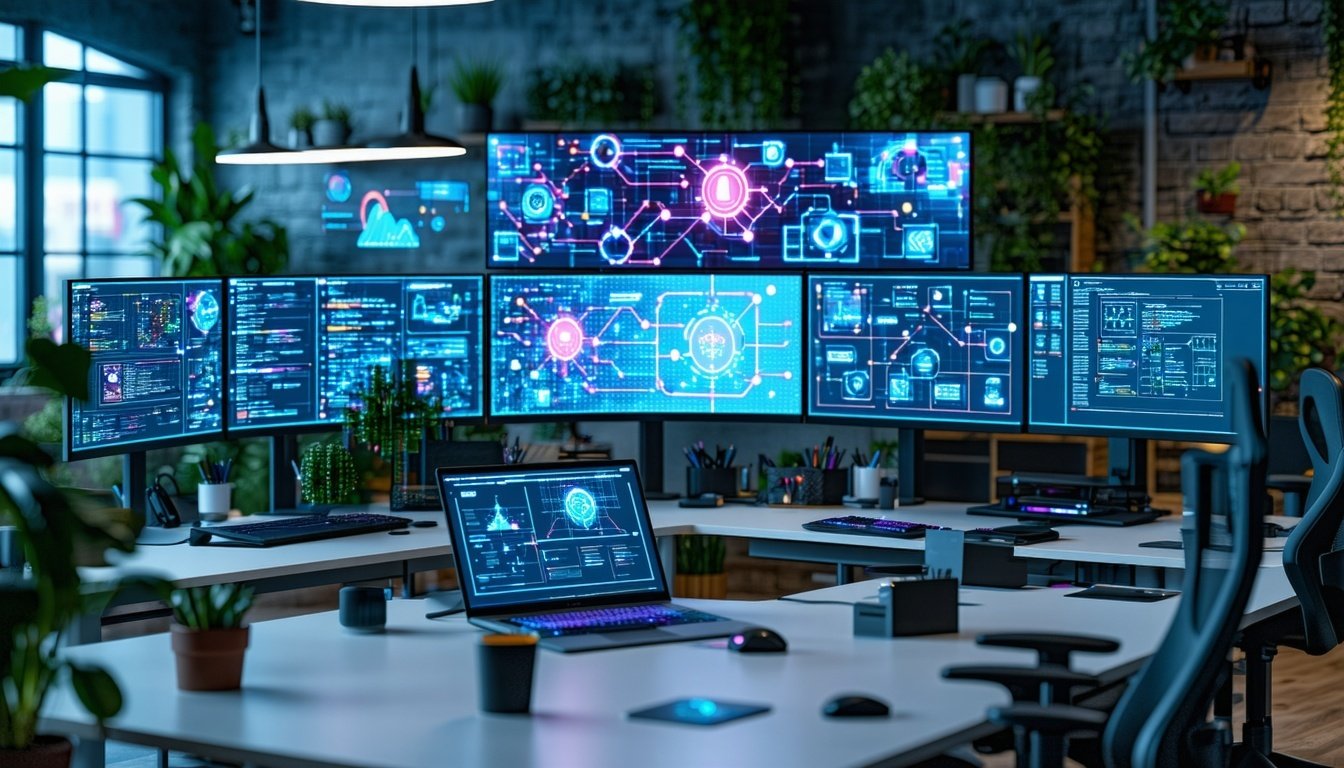
Transforming Software Engineering with Generative AI
Discover how generative AI is redefining software development by significantly boosting developer productivity.
The Rise of Generative AI in Software Engineering
Generative AI has quickly become a pivotal technology in the realm of software engineering. By leveraging advanced algorithms and machine learning models, generative AI can perform tasks that traditionally required significant human effort. These capabilities extend beyond mere automation; generative AI can innovate and optimize processes, paving the way for a new era in software development.
The adoption of generative AI is driven by its ability to handle complex tasks such as code generation, documentation, and automated testing. These advancements not only reduce the workload on developers but also enhance the quality and efficiency of software projects. As organizations strive to stay competitive, the integration of generative AI in software engineering is becoming an essential strategy for achieving greater productivity and innovation.
Enhancing Developer Productivity with AI-Assisted Coding
One of the most significant impacts of generative AI in software engineering is its ability to enhance developer productivity through AI-assisted coding. This technology can generate code snippets, suggest improvements, and even complete entire functions based on the context provided by the developer. By automating repetitive and time-consuming coding tasks, developers can focus on more complex and creative aspects of software development.
For instance, Turing has reported a 33% increase in developer productivity by utilizing AI-assisted coding tools. These tools analyze existing codebases, learn from them, and provide intelligent code suggestions that align with the project's requirements. This not only speeds up the development process but also reduces the likelihood of errors, leading to more robust and reliable software.
Streamlining Code Documentation with Generative AI
Code documentation is a critical aspect of software development, but it is often neglected due to its tedious nature. Generative AI addresses this challenge by automating the documentation process. AI-powered tools can generate comprehensive documentation that includes code explanations, usage examples, and API references.
These tools analyze the codebase to understand its structure and functionality, then produce documentation that is both accurate and detailed. This not only saves developers time but also ensures that the documentation is consistently up-to-date. As a result, teams can maintain high standards of code quality and readability, facilitating smoother collaboration and onboarding of new team members.
Automated Testing: Reducing Errors and Improving Efficiency
Automated testing is another area where generative AI is making a substantial impact. Traditional testing methods can be time-consuming and prone to human error. Generative AI can automate the creation and execution of test cases, ensuring comprehensive coverage and faster detection of issues.
By leveraging machine learning models, AI-powered testing tools can identify patterns and anomalies in the code, generating test cases that cover a wide range of scenarios. This not only reduces the time required for testing but also enhances the accuracy and reliability of the tests. As a result, developers can identify and resolve issues more quickly, leading to higher quality software and faster release cycles.
Accelerating DevOps with AI-Powered Solutions
DevOps practices aim to streamline the software development lifecycle by integrating development and operations teams. Generative AI plays a crucial role in accelerating DevOps processes by automating various tasks such as continuous integration, continuous deployment, and infrastructure management.
AI-powered DevOps tools can monitor system performance, predict potential issues, and optimize resource allocation. By automating these tasks, teams can achieve faster and more reliable deployments, reduce downtime, and ensure that applications run smoothly in production environments. This enhances the overall efficiency of the DevOps pipeline and allows teams to deliver value to customers more rapidly.
Success Stories: Turing’s 33% Productivity Increase
The impact of generative AI on software engineering is best illustrated through real-world success stories. Turing, a company that specializes in remote developer hiring, has leveraged generative AI to achieve a remarkable 33% increase in developer productivity. By integrating AI-assisted coding tools into their workflow, Turing's developers can write code more efficiently and with fewer errors.
These tools provide intelligent code suggestions, automate repetitive tasks, and ensure that best practices are followed throughout the development process. As a result, Turing's developers can focus on more strategic and innovative tasks, leading to higher quality software and faster project completion times. This success story demonstrates the tangible benefits of generative AI in enhancing developer productivity and overall project outcomes.
Implementing Generative AI: Best Practices for Software Teams
Implementing generative AI in software engineering requires careful planning and execution. Here are some best practices for software teams looking to integrate AI-powered solutions into their workflows:
- Start Small: Begin with pilot projects to test the effectiveness of generative AI tools. This allows teams to understand the technology's capabilities and limitations before scaling up.
- Focus on High-Impact Areas: Identify areas where generative AI can deliver the most value, such as code generation, documentation, and testing. Prioritize these areas to achieve quick wins and build momentum.
- Collaborate and Train: Ensure that team members are trained on how to use AI tools effectively. Foster a collaborative environment where developers can share insights and best practices.
- Monitor and Optimize: Continuously monitor the performance of AI tools and gather feedback from developers. Use this information to optimize the tools and improve their effectiveness over time.
- Integrate with Existing Workflows: Seamlessly integrate AI tools into existing workflows to minimize disruption. Ensure that the tools complement and enhance the team's current processes.
By following these best practices, software teams can harness the power of generative AI to boost productivity and drive innovation.
Future Prospects: The Evolving Role of AI in Software Development
The role of generative AI in software development is continuously evolving. As AI technologies advance, we can expect even greater capabilities and more sophisticated tools that further enhance developer productivity. Future prospects include:
- Advanced Code Generation: AI models will become more adept at understanding complex codebases and generating high-quality code that meets specific requirements.
- Intelligent Debugging: AI-powered debugging tools will be able to identify and resolve issues with greater accuracy, reducing the time and effort required for debugging.
- Personalized Developer Assistants: AI assistants will offer personalized support to developers, understanding their preferences and providing tailored suggestions and guidance.
- Enhanced Collaboration: AI tools will facilitate better collaboration among development teams by providing real-time insights and recommendations.
- Predictive Analytics: AI will leverage predictive analytics to anticipate potential issues and proactively suggest solutions, improving the overall reliability and performance of software applications.
As generative AI continues to advance, it will play an increasingly vital role in shaping the future of software engineering. By embracing these technologies, software teams can stay ahead of the curve and deliver innovative solutions that drive success in a rapidly changing digital landscape.

